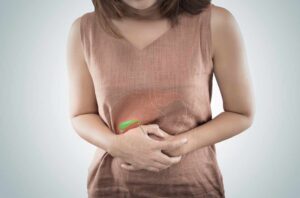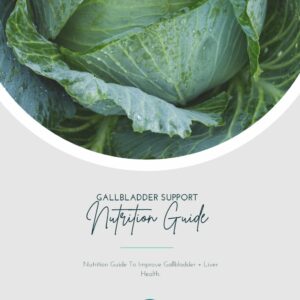Low Stomach Acid and Gallbladder Issues? What You Need to Know
If you’ve been dealing with gallbladder issues for some time– like myself– you have an idea about the importance of bile relating to the gallbladder.
But what about stomach acid?
Bile helps digest fats and absorb nutrients from foods in the small intestine.1 And stomach acid does the same, but from within the stomach.
For bile to function, stomach acid needs to first initiate the breakdown of foods. But if your stomach acid isn’t doing its job properly, there can be a spiral of complications in the rest of your digestive tract.
As a functional nutritionist focusing on all things gallbladder, I have TONS of clients with gallbladder disease who complain about heartburn and acid reflux symptoms. And it’s hard for them to decipher whether these are symptoms of bile reflux from gallbladder issues or stomach acid imbalances.
So before jumping to conclusions, I want to educate YOU on what to look out for. Because symptoms like heartburn and acid reflux may or may not be caused by your gallbladder.
Research actually shows that more than 80% of patients who go into gallbladder removal surgery with reflux or heartburn still experience these symptoms – sometimes even worse– without a gallbladder.2
So understanding the symptoms of low stomach acid vs. bile reflux can help us have a better understanding of what really might be going on with your digestion.
Let’s dive into this blog all about the relationship between stomach acid and bile, and how low stomach acid levels can lead to gallbladder issues.
How Low Stomach Acid Can Cause Gallbladder Issues
Stomach acid plays a crucial role in your digestion. It’s made in the lining of your stomach and is released to break down food in your digestive tract. Stomach acid helps ensure the absorption of key nutrients from your food.
For stomach acid to be effective it needs to be highly acidic.3 From meats to fibrous veggies to all the other dense foods you may eat, stomach acid needs to have a low enough pH to break all this down.
highly acidic.3 From meats to fibrous veggies to all the other dense foods you may eat, stomach acid needs to have a low enough pH to break all this down.
The lower the pH of your stomach acid, the more acidic it is. This means it’s ideal for food digestion. But what happens when your stomach acid levels are too low?
Low levels of stomach acid occur when your stomach isn’t producing enough acid to maintain an acidic enough environment for full digestion.
And low stomach acid can directly affect the gallbladder.
With low stomach acid comes reduced bile release. If your food isn’t acidified fully before leaving the stomach, the gallbladder will not be triggered to release bile. So insufficient acidification of food in the stomach decreases the excretion of bile.
Bile and stomach acid have to work together as we’ve discussed. But without bile release, complications can be felt throughout the body, and gallbladder functioning is decreased.
Bile can back up into the gallbladder and liver from improper release, resulting in issues with digestion and discomfort.
What Causes Low Stomach Acid?
Low stomach acid can be caused by several factors. Here are a few of the common causes of low stomach acid.
- Age-related changes– people over 65 are more likely to experience low stomach acid.
- Diet– nutrient deficiencies can be a key factor leading to low stomach acid.
- Stress– high levels of stress put a strain on our systems and can lead to inadequate stomach acid for digestion.
- Illness– diseases or infections in the stomach impair stomach acid levels.
Low stomach acid not only impacts the gallbladder but also affects your overall digestive health.
Common complications that can arise from chronically low stomach acid include:
- Difficulty digesting foods and absorbing nutrients
- Damage to your entire gastrointestinal system
- Increased risk for infections or chronic illness
Chronically low stomach acid is called hypochlorhydria. And hypochorhydria can lead to conditions like gastritis, asthma, lupus, thyroid issues, and more if not treated.4
Symptoms of Low Stomach Acid and Gallbladder Issues
 So how do you know if you’re experiencing low stomach acid in your digestive system?
So how do you know if you’re experiencing low stomach acid in your digestive system?
Common symptoms of low stomach acid include:
- Heartburn and indigestion
- Bloating and gas
- Nutrient deficiencies
Low stomach acid symptoms can look a lot like bile reflux symptoms seen with gallbladder disease. But these are two separate processes in the body.
Differentiating factors of bile reflux include:
- Severe upper abdominal pain or discomfort
- Frequent heartburn
- Vomiting bile– often a greenish-yellow fluid
For those of you with gallbladder problems already, it’s essential to do what you can to support adequate stomach acid for proper digestion. As always, when you’re experiencing new or worsening symptoms, make sure to reach out to a healthcare provider for further advice.
Why Stomach Acid Is Important for Bile
So let’s look deeper into the relationship between stomach acid and bile.
Bile is made in the liver and then stored in the gallbladder. It’s released from the gallbladder to aid in the breakdown of foods in the small intestine. Bile aids in your digestion and emulsifies fats from the food you eat.
Stomach acid plays a role in signaling the release of bile from the gallbladder when digestion begins. It also activates the digestive enzymes needed to break down food.
So… if stomach acid levels are low, inhibition of bile release can occur. And when you have inadequate bile, there can be consequences.
Two of the primary consequences of not having enough bile are:
- Malabsorption of fats and fat-soluble vitamins
- Gallstone formation
As gallbladder patients, ensuring proper digestion and avoiding gallstone formation are key to promoting our health!
Strategies for Managing Low Stomach Acid and Gallbladder Issues
Managing low stomach acid is possible. With lifestyle and dietary changes, there are ways you can support healthy digestion and boost stomach acid levels.
 Some easy at-home suggestions for increasing stomach acid are:
Some easy at-home suggestions for increasing stomach acid are:
- Eating zinc-rich foods like meats, fish, and other seafood
- Drinking apple cider vinegar
- Incorporating fresh ginger into your meals or smoothies
- Limiting processed foods
- Drinking plenty of water
- Reducing stress
Supplements or medications are also available to help alleviate symptoms. Hydrochloric acid supplements can help keep your stomach acid levels up.
Additional medications can be discussed with your health care provider if at-home remedies don’t help with low stomach acid symptoms.
Avoid Low Stomach Acid and Optimize Your Digestion!
Stomach acid is key to supporting the healthy digestion of foods. And bile helps continue the food digestion process in the small intestine.
Maintaining adequate stomach acid levels will help reduce heartburn and reflux symptoms, and keep your gallbladder functioning as best as it can. 
As a gallbladder disease patient myself, I’ve learned how to manage my gallbladder disease symptoms and avoid getting gallbladder removal surgery. And now I help others struggling with gallbladder disease to feel like themselves again.
So if you’re looking for more diet and lifestyle tips to help YOU save your gallbladder too, check out my Gallbladder Saver Society!
This monthly membership gives you access to gallbladder masterclasses, live Q & As with me– a functional gallbladder nutritionist– and tons of content on how you can optimize your health to avoid gallbladder surgery.
It’s time to take charge of your health, and to get to the root cause of your symptoms so you can tackle them head-on– and be a more empowered gallbladder patient!
References
- Chiang JY. Bile acid metabolism and signaling. Compr Physiol. 2013 Jul;3(3):1191-212. doi: 10.1002/cphy.c120023. PMID: 23897684; PMCID: PMC4422175.https://www.ncbi.nlm.nih.gov/pmc/articles/PMC4422175/
- Dr.Malladi. Bile and Acid Reflux After Gallbladder Removal. https://www.drmalladi.com/acid-reflux-after-gallbladder-removal/#:~:text=Frequency%20of%20Bile%20Reflux%20After%20Cholecystectomy&text=Studies%20show%20that%20bile%20reflux,after%20having%20your%20gallbladder%20removed.
- Holland, K. How Strong Is Stomach Acid? Mar. 27, 2023. https://www.healthline.com/health/how-strong-is-stomach-acid#low-levels-of-h-cl
- Dix, M. Hypochlorhydria (Low Stomach Acid). Mar. 30, 2019. https://www.healthline.com/health/hypochlorhydria#symptoms

